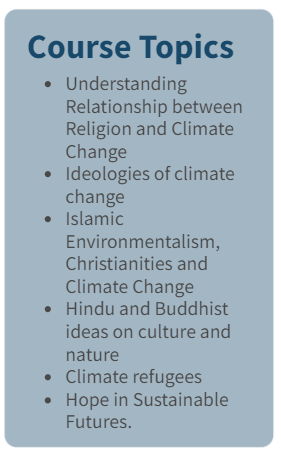The End of the World As We Know It? Climate Change, End Times and Sustainable Futures
Course Summary:
This 3rd-year Bachelor level course seeks perspectives and resources from different theological, philosophical, and spiritual traditions to understand and respond to climate change. It explores effective responses to climate change to help address new social, political, economic, moral, and environmental realities across society. Students study various eschatological visions and their interpretations of climate change and solutions. It critically evaluates the role of technology and the economy in tackling the crisis and examines ethical and existential aspects of humanity's relationship with nature and future generations. The "flipped classroom" approach involves pre-class podcast listening and readings, followed by in-class discussions with guest speakers.
Course Design:
- International and Interdisciplinary Perspectives

The course is designed around core concepts around the theme Climate Change, End Times and Sustainable Futures. Short introductory videos to these concepts are provided to students. The main goal of this course is for students to explore different religious and philosophical traditions, how they understand the relationship between humanity and nature, religion and science, end times and the future. Some of the topics include: understanding relationship between religion and climate change, ideologies of climate change, Islamic environmentalism, Christianities and climate change, Hindu and Buddhist ideas on culture and nature, climate refugees, hope in sustainable futures.
- Active Teaching Methodologies
The course is modelled on the “flipped classroom” concept. Students are expected to listen to the podcast recordings and complete the required readings before attending each class. These materials are then used for discussions with guest speakers during class, and in group activities focused on preparation for final group and individual assessment.
Further, students are able to evaluate diverse perspectives and develop their own arguments and vision for sustainability while recording two podcast episodes of 20 minutes each. In groups of 4 or 5, they reflect together on the teaching materials (podcast episodes, readings) and discussions in class. The first episode covers first four weeks of the course while the second episode covers the last three weeks of the course. All group members participate in both episodes and the episode is recommended to be recorded as a group discussion and conversation. Each podcast episode is also accompanied by a written summary of the key points raised.
- Formative Assessments and Feedback
The course assesses students in several unique ways. The students are evaluated for:
- leading a discussion with a guest lecturer,
- producing two 20-minute podcast episodes reflecting on course materials,
- a policy paper for a fictional civil society organization or political party responding to climate change,
- and a final individual essay. The final essay topic can be chosen from a list of questions provided in the beginning of the course and involves peer review. Students are also given the grading criteria for communicating expectations clearly.
Contact:
Prof E.K. (Erin) Wilson,
